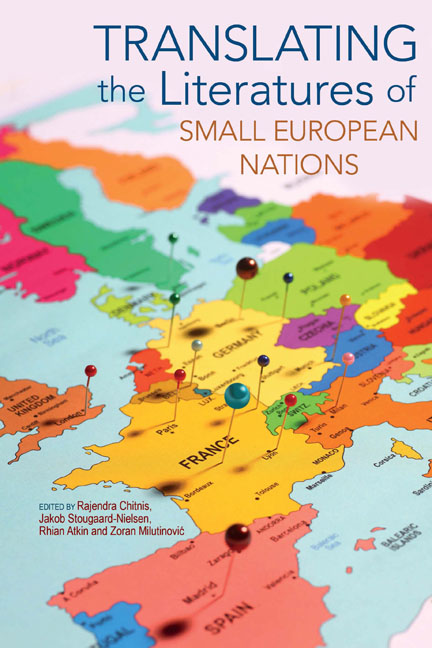Book contents
- Frontmatter
- Contents
- Acknowledgements
- Introduction
- 1 The Global Presentation of Small National Literatures: South Slavs in Literary History and Theory
- 2 Translators as Ambassadors and Gatekeepers: The Case of South Slav Literature
- 3 Supply-driven Translation: Compensating for Lack of Demand
- 4 Literature as Cultural Diplomacy: Czech Literature in Great Britain, 1918–38
- 5 Exporting the Canon: The Mixed Experience of the Dutch Bibliotheca Neerlandica
- 6 Creative Autonomy and Institutional Support in Contemporary Slovene Literature
- 7 Strategies for Success? Evaluating the Rise of Catalan Literature
- 8 Gender, Genre and Nation: Nineteenth-century Swedish Women Writers on Export
- 9 Translating as Re-telling: On the English Proliferation of C.P. Cavafy
- 10 Criminal Peripheries: The Globalization of Scandinavian Crime Fiction and Its Agents
- 11 Literary Translation and Digital Culture: The Transmedial Breakthrough of Poland's The Witcher
- 12 Towards a Multilingual Poetics: Self-translation, Translingualism and Maltese Literature
- 13 Does Size Matter? Questioning Methods for the Study of ‘Small’
- Coda: When Small is Big and Big is Small
- Index
Coda: When Small is Big and Big is Small
- Frontmatter
- Contents
- Acknowledgements
- Introduction
- 1 The Global Presentation of Small National Literatures: South Slavs in Literary History and Theory
- 2 Translators as Ambassadors and Gatekeepers: The Case of South Slav Literature
- 3 Supply-driven Translation: Compensating for Lack of Demand
- 4 Literature as Cultural Diplomacy: Czech Literature in Great Britain, 1918–38
- 5 Exporting the Canon: The Mixed Experience of the Dutch Bibliotheca Neerlandica
- 6 Creative Autonomy and Institutional Support in Contemporary Slovene Literature
- 7 Strategies for Success? Evaluating the Rise of Catalan Literature
- 8 Gender, Genre and Nation: Nineteenth-century Swedish Women Writers on Export
- 9 Translating as Re-telling: On the English Proliferation of C.P. Cavafy
- 10 Criminal Peripheries: The Globalization of Scandinavian Crime Fiction and Its Agents
- 11 Literary Translation and Digital Culture: The Transmedial Breakthrough of Poland's The Witcher
- 12 Towards a Multilingual Poetics: Self-translation, Translingualism and Maltese Literature
- 13 Does Size Matter? Questioning Methods for the Study of ‘Small’
- Coda: When Small is Big and Big is Small
- Index
Summary
Size matters, so the saying goes. And yet. I happen to be visiting professor in Chengdu for a three-year period, and it came as a shock for my students at Sichuan University when I told them that the number of my fellow Danes only amounts to one-third of the population of their home city, which holds around 16 million people. And for China as a whole – well, to compare the number of my compatriots with the entire population of China exceeds my mathematical skills. ‘But Hans Christian Andersen, Isak Dinesen, crime fiction, some Danish movies and TV series have more readers and viewers in China than any Chinese writer has across the world!’, they exclaim. Which is true, but this truth also disrupts our immediate and apparently self-evident understanding of what is small and what is not.
This should come as no surprise. Since the story of David and Goliath, it has been common knowledge that maybe small is small, but also that this platitude does not tell us anything about the importance, strength and resilience of the small guy compared to the big bloke. Small is big and big is small. The area of literature is no exception from this observation, for which this collection of articles offers amply evidence with examples from books, writers, films and TV series from less dominant European languages and from concerted efforts to successfully promote translations to reach an international audience.
This book is the outcome of an AHRC-funded research project called ‘Translating Literatures of Smaller European Nations’. As all research worth its name, this project does more than proving the relevance of its subject and providing us with new knowledge. It also pushes us, readers and researchers alike, to ask basic questions anew in a more nuanced and maybe more profound way. Thus, having read the book one might ask: will the use of the term ‘nations’ in ‘small nations’ (euphemistically called ‘smaller’) serve as the best key term to bring our reflections further? Apparently not. Examples from Catalan, among other languages, and the ambiguous relationship between Serbian and Croatian suggest otherwise. Despite debates on possible independence, Catalonia is not, at time of writing, a nation state; before Serbia and Croatia seceded from Yugoslavia, each now with a national language, Serbo-Croatian was regarded as one language with internal differentiations.
- Type
- Chapter
- Information
- Translating the Literatures of Small European Nations , pp. 267 - 272Publisher: Liverpool University PressPrint publication year: 2019



